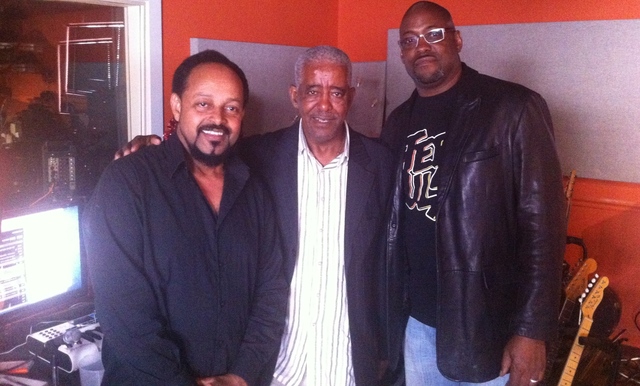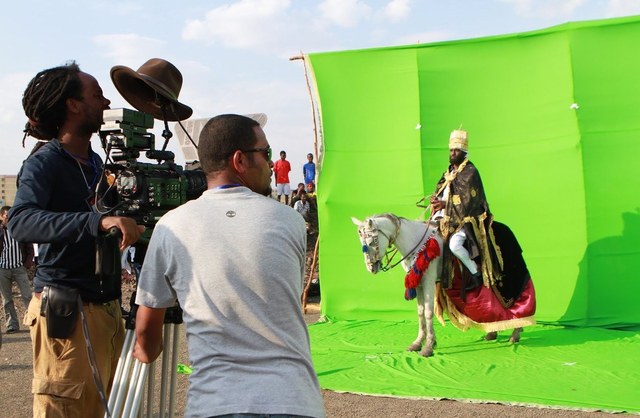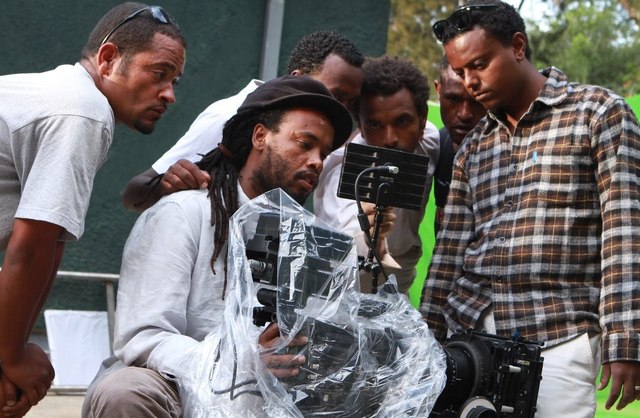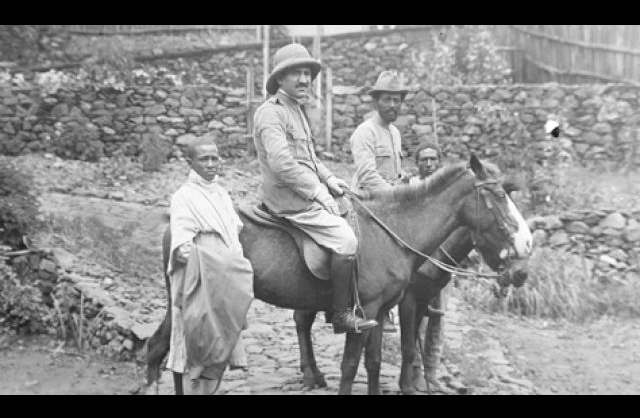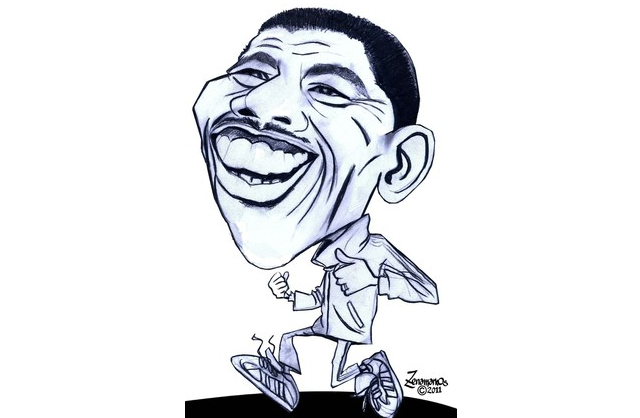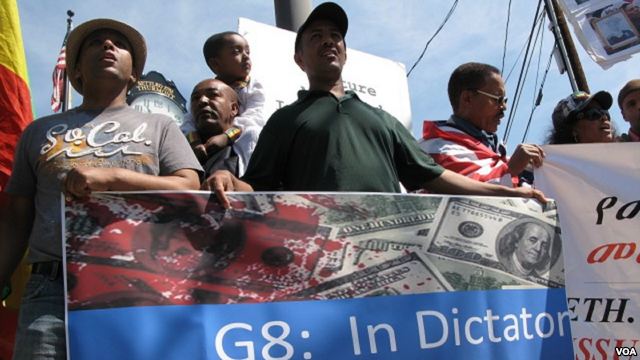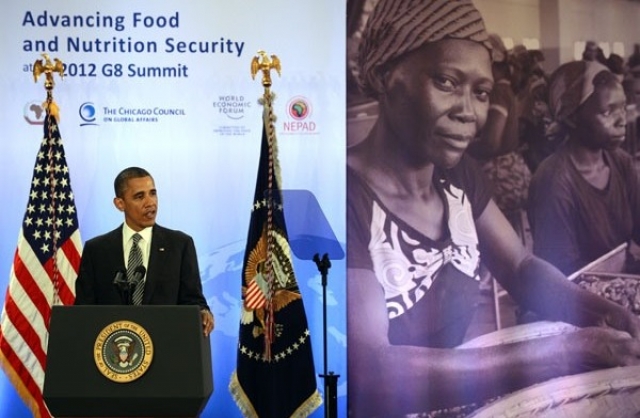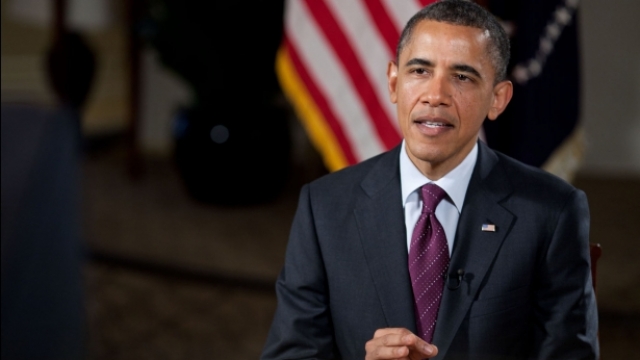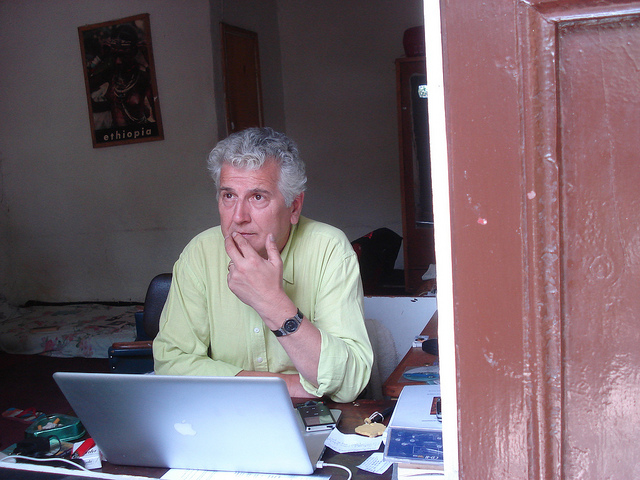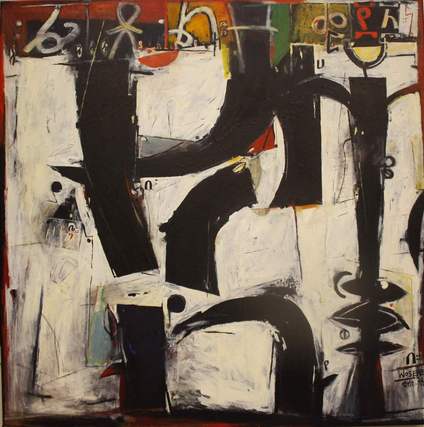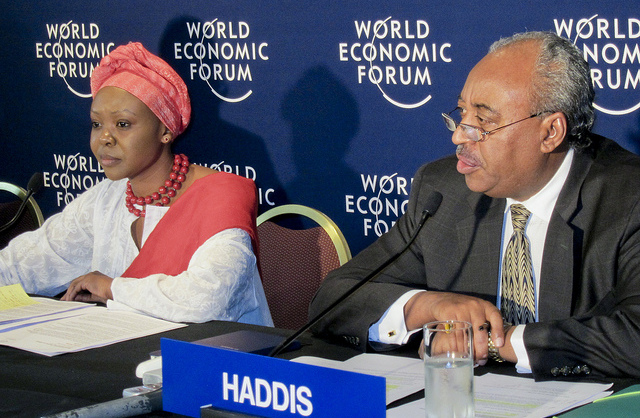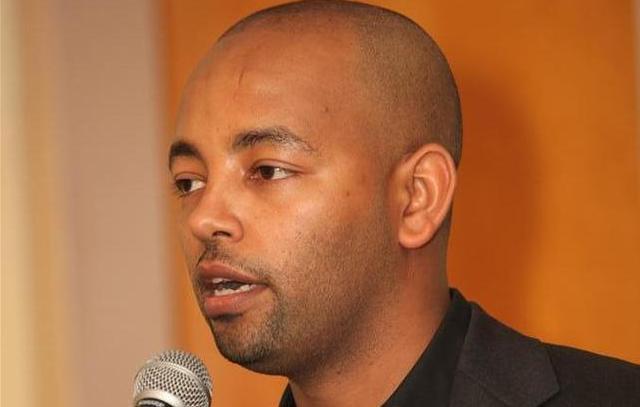Tadias Magazine:
By Tadias Staff
Updated: Tuesday, July 17, 2012
New York (TADIAS) – In our time, polarized Ethiopian politics and highly opinionated media is not new. What’s new, however, is the young generation of Ethiopians in the Diaspora who are driven to similar tactics as a result of being frustrated with the politics of ‘you’re-either-with-us-or-against-us’ back in their birth country.
In an interview with TADIAS Ethiopian-American blogger and online radio host Teddy Fikre, who is the founder and editor of browncondor.com, said “as long as Eskinder Nega is in prison, there will be war,” referring to the award-winning Ethiopian journalist who was sentenced on Friday to 18 years in prison on terrorism charges.
Four years ago, when TADIAS first featured Teddy, he was an enthusiastic volunteer with the Obama campaign, eventually becoming one of the coordinators of ‘Ethiopians for Obama.’ But today, he is an outspoken opponent of the Obama administration’s foreign policy towards Ethiopia and the Ethiopian government.
His activism has earned him both friends and enemies in the community.
Below is our summary of a Q & A with Teddy Fikre – the first in a series of interviews offering different perspectives from young Ethiopian-Americans, their take on political affairs and how they are reacting via social media:
TADIAS: Thank you Teddy for your time.
Teddy Fikre: Thank you and first let me say how honored I am to be provided this platform to speak my mind. Of course, this is nothing new. You were the first Ethiopian publication to give me a voice in 2008 when I was a part of Ethiopians for Obama. I have no problem stating that you literally plucked me from obscurity and gave me a stage to speak for and to our community. What you did for me was no small gesture. But then again, you did not do that for me, you did that for our community. That is what I love and respect about Tadias, it would be easy for you to be sensational and chase the most scandalous headlines, as you know the quickest way to make money is to act like Fox News and peddle Yellow Journalists. Instead, you stay true to the essence of journalism, your whole staff is the very definition of professional and responsible journalism. I will always remember that it was Tadias and Ethiopian Review that believed in me when I first stepped back in the Ethiopian community and reconnected with my people. For that I will forever remain grateful to Tadias. The mere fact that you are interviewing me when you could easily dismiss me as your “competition” shows me that you believe in your core in the essence of Hebret. A long winded intro I know, but this is the essence of my life mission, to get everyone to understand the value of Hebret (collaboration) and disavow the notion of competing.
TADIAS: Please tell us about BrownCondor.com. What does the name mean, what inspired it?
Teddy Fikre: Brown Condor is the nickname of an African-American pilot by the name of Colonel John C. Robinson. He was known as the father of the Tuskegee Airmen. When Ethiopia was invaded by Italy during World War II, Brown Condor made his way to Ethiopia and ended up being the commander of the Ethiopian Air Force, he became the most heavily decorated non-Ethiopian in the history of Ethiopia, trained the first crew of the Ethiopian Airlines and ended up dying in Ethiopia after his plane crashed. His resting place is in Gullele Cemetery. It is my goal in life to get the Airport in Ethiopia named after Brown Condor and for Colonel John C. Robinson be recognized widely for his contributions to Ethiopia. This is my life mission, to tell our story fully and broadly. We have an amazing history, a history that is an amalgamation of Ethiopians and non-Ethiopians alike. I am doing my small part, I encourage everyone to do the same. Tell our stories instead of sharing stories about yogurt or Tom Cruise on Facebook and twitter.
TADIAS: Please tell us more about yourself (where you were born, grew-up, education, etc, and how you developed your passion for your work)
TF: I was born in Ethiopia in 1974 — ironically the same year that the Derg swept into power, in fact the same month. I grew up in Bole for seven years of my life before moving to America in 1983. Our first destination was New York when we arrived in America for good (yes I can claim to be a New Yorker) and from there moved to Alexandria, Virginia (or as I call it Alexababa). I attended George Mason University for undergrad and attended Johns Hopkins where I earned an MBA and paid particular attention to marketing and social networking.
My passion has always been media in one way or another. I loved to write from the time I was a teenager. I produced the first ever talk show when I was 17 years old at Woodbridge Senior High School. My major in college was Mass Communications with a focus on TV productions until I lost interest and focused on everything and nothing concurrently. My love for public service traces its roots to the African-American struggle for liberation and of course Adwa. Adwa was public service, the Civil Rights Movement was public service, Che Guevara was public service, and of course my parents were the essence of public service. Thus, finally after 37 years, I have arrived at a place–and intersection — of public service and Mass Media. I leave it to God and my hard work to see where that will take me in the next 37 years.
TADIAS: When we first highlighted your work on Tadias four years ago, you were hard campaigning during the last presidential election – trying to organize the Ethiopian American community to vote. What are some of the lessons that you’ve learned from that experience about the community? (Both the potential and the problems)
TF: So much to tell so few words. You know in 2008, I re-emerged into the Ethiopian community with so much hope and a belief that we as Ethiopians in America can unite and change US policies that will positively affect Ethiopians in America and more importantly alleviate the suffering of our children back in Ethiopia. I found out about Hebret and convinced the Obama campaign that the Ethiopian constituency could be the voter block that could swing the election.
In retrospect, I feel like I lied to the Obama campaign. We as Ethiopians are in a deep state of coma, we are indifferent and the majority do not believe in Hebret at all. Most are just interested in sipping buna, talking irrelevant politics, drinking Johnny Walker and complaining about Meles Zenawi using fake accounts on Facebook. I don’t know what happened to our people, we defeated the Italians twice, but left to this generation if this was 1896, I would be saying this to you in Italian.
However, there is hope. One by one I am linking up with enlightened Ethiopians who are not dollar greedy and care instead for the needy. All we need is 100 enlightened Ethiopians who care about Ethiopia deeply and we can liberate the rest of enslaved Ethiopians who care more about complaining on Facebook and Twitter instead of doing the hard work to make Ethiopia a better nation instead of a beggar nation. We have all the resources and brain power to make a difference, we can feed the entire of Africa if we put our minds to it. But we cannot do that as long as we are unable to get over our individual and collective inertia and until we expose each and every agent of greed that pillages Ethiopia in our names. Not speaking up against injustice and turning to indifference makes everyone a part of the injustice. I am unable to sleep some nights as I speak up and out against all the injustice I see. For that I am called crazy, but if crazy is trying to save an Ethiopian child from dying from hopelessness I wear that crazy label with honor and feel a deep and abiding remorse and shame for the “sane” ones who see injustice and choose to do nothing about it.
TADIAS: This leads us to your most recent topics featured on BrownCondor? (read full articles here and here )
I am not sure where to start. Look, when I first started writing about Ethiopia in 2008, my aim was to highlight the beauty of our history and our heritage. However, along the way, after years of being bled dry by greedy Habeshas who I helped endlessly only to end up being taken advantaged of and insulted behind my back (I call this being Ozeried), I felt a changing of my spirit and the naive me was transformed into a guarded soul and a skeptic. I still believe in Hebret, but I no longer just swallow the poison some would feed me as I feed them hope. So at times, when the people I help betray me and sully my name, I lash out. I lash out because I had a crash course in incivility and realized that in our community hebret is spelled Terbeh as the essence of unity and helping each other is inverted by our community leaders left and right.
So to be honest, I became radicalized. I am a radical who sees non-profits who claim they are helping Ethiopian children even though they don’t have a 501-3-C and they drive Mercedes E Class sedans and live in mansions. I am a radical who understands the ways of political parties (both pro and anti TPLF) as they continue to use Ethiopia to line their pockets. The God’s honest truth is that political opposition movements don’t want Meles Zenawi to go anywhere, the 66 political parties and TPLF have a symbiotic relationship. In order for the 66 political parties to exist, they need Meles to be the henchman. In order for Meles Zenawi to exist, he needs the 66 political parties as henchmen. This is how the game is played, if this was not a game, all 66 political parties would unite under one umbrella and disavow the use of useless acronyms for a lifetime. Alas, the 66 political parties will not do that because they would rather be in charge instead of taking charge. This is the way of Habeshas in the 21st century, everyone is a “Founder”, “President”, or “CEO” while none of them do the hard work to change our dying Ethiopia.
TADIAS: In the past, you have also expressed interest to run for a public office. Is that still on the burner?
I am still planning on running for Congress in 2014. I am not blind to what will happen though. I have already created all the negative ads that Congressman Jim Moran could want on Youtube with my tirades against my community. I can only imagine the commercials that will be popping up on TV, “this is Teddy Fikre, is this who you want to be your Congressman?” followed by my tirades. But I am not ashamed of anything I put on Youtube. I spoke the truth, this is why I will be an awful politician.
I am simply an organizer, and for that I will lose by a stunning margin to Jim Moran. But I am not running to win, I am running to inspire my people to think big. I am running so that a future Teddy could think audaciously and run for Congress. I am running so that an Ethiopian without the baggage that I have can become the first ever Ethiopian Congresswoman. I am by no means Moses, I am too sinful and too much of this world to ever claim to be biblical, but I want people to understand that it was not Moses that delivered the Jews to the “Promise Land”. That person was Joshua (Eyasu). I am desperately looking for our Eyasu generation. That is why I am running for office in 2014, to awaken the Eyasu generation. I am Teddy Fikre, and I approve this message!
TADIAS: What would like to say to President Obama today as he seeks reelection?
When it comes to his policies towards Africa as a whole and Ethiopia specifically, I am a person who has been deeply disappointed and dismayed. I worked my tail off in 2008 thinking that Obama would liberate Africa and usher in a new day where aid is replaced by investment. Instead, what we have is a continuation of the Bush policies on steroids. Moreover, the Obama administration disregards the suffering children of Ethiopia and neglects rank tyranny and oppression in Ethiopia. “Injustice anywhere is a threat to justice everywhere.” I might or might not vote for Obama in 2012, I will most definitely not vote for Romney. I might just go in the voting booth and write in “Adwa Spring” as my show of protest. Until and unless Obama changes his policies towards Ethiopia and Africa as a whole, I cannot in good conscience encourage other Ethiopians and Africans to vote for him. It saddens me to say that, but it saddens me more to see children dying on a minute by minute basis in Ethiopia. Obama can change that, instead he embraces Meles Zenawi. For that, I have gone from a “Hopemonger” to a hopeless nomad. Well, there goes my endorsement from Obama in 2014 aydel?
TADIAS: Is there anything else you would like to share with our audience that we have not asked you about?
I want people to know that in my heart, I have nothing but love for Ethiopia. I have finally — after years of walking in the desert –seized upon my passion in life. I love writing about Ethiopia, I love organizing my people, and I love marketing Ethiopian culture to the world. I want Mahmoud to sing at the White House, I want 100 Wayna Wondwossens to win Grammy Awards, I want Ellias Fullmore to be our version of K’naan, I want Kuku Sebsebe to sing at the Kennedy Center, and I want Teddy Afro to sing with Jason Mraz.
However, I cannot turn a blind eye to the injustices that I witness and the injuries that are caused on a daily basis. So for the time being, I am going to stop marketing our culture and instead expose moles in our community who bleed our community dry. The day will come where I will go back to my passion and write beautiful things about my country and my community. But that day is not today, as long as Eskinder Nega is in prison, there will be war. Until a child in Ethiopia has equal opportunity without regard to tribe, there will be war. The time of peace will come, this I believe, but for now, it is a war of ideas, and I am joining that war with my pen. Now is the time of the Adwa Spring, I hope more people join this campaign to liberate our enat Ethiopia and turn her into the Japan of Africa. Yichalal!
TADIAS: Thank you, Teddy.
Amesegenalew Tadias, and as always continue to be the beacon of Ethiopia. You have and always will give me a connection to Ethiopia and you let me say Tadias to my country and to my father in heaven. In the end, we all want a better Ethiopia, not a beggar Ethiopia. Ena Bertu, tenesu, tesebsebu, be Hebret enashenef!”
—
You can learn more at browncondor.com, twitter, and Facebook.
